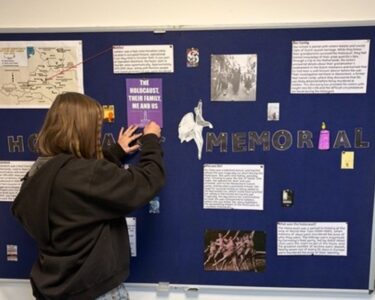Wednesday 27 January marks Holocaust Memorial Day and the liberation of Auschwitz-Birkenau, the largest Nazi death camp.
This year, the UCL Centre for Holocaust Education will be joined by Holocaust survivor Mala Tribich and Sir Keir Starmer, MP for St Pancras and Holborn, in a small candle-lighting ceremony to mark Holocaust Memorial Day. This commemorative ceremony will take place at the London Knowledge Lab, Emerald Street.
Those attending will remember the millions of Jews killed in the Holocaust and all victims of Nazi persecution.
The theme of Holocaust Memorial Day 2016 is ‘Don’t stand by‘. The Holocaust and subsequent genocides took place because local populations allowed insidious persecution to take root. Whilst some actively supported or facilitated state policies of persecution, the vast majority stood by silently – at best, afraid to speak out; at worst, indifferent.
UCL Centre for Holocaust Education’s classroom materials, ‘Being human?‘ speak directly to the issues on the danger of silence in the face of unfolding persecution and genocide and go even further. Not only are students invited to explore real cases of those who risked everything to rescue victims from the Nazis, they also explore how millions became complicit in the persecution and murder of their neighbours. The census workers in Nazi Germany who diligently kept records not only of where people lived, their age and gender, but also their ‘race’; the businesses, industry and farms that made use of slave labour; the hundreds of thousands who took the jobs, houses and property of deported Jewish families. This was not just ‘standing by’. It was benefiting from the persecution.
In the modern world, the actions we take can have an impact on people many miles distant from where we live. So it is not enough merely to speak out against the crimes of others. It is all too easy to become implicated in these crimes ourselves. The companies we work for, the roles we play, the goods we buy, can fuel human suffering on a vast scale. For the young people with whom we work, the implications for how they will lead their own lives are deep, troubling and profound.
Mala Tribich – Don’t stand by
As a young girl living in Poland, following the Nazi invasion in 1939, Mala experienced many personal tragedies during the Holocaust. Her mother and sister were murdered and all remaining family members deported to concentration camps. Her only relative to survive was her brother Ben.
Whilst still a child, Mala lived and was enslaved to work in unimaginable conditions in a Jewish ghetto and within concentration camps and survived a life-threatening illness during her time at Bergen-Belsen.
Over the past 20 years Mala has chosen to share her story with school children around the country, each time recounting her painful and emotionally draining experiences to help preserve the memory of the millions of Jewish victims who perished during the Holocaust who have no-one to remember for them.
Mala believes strongly that continuing with education about the Holocaust is essential to ensuring the horrific experiences of this period of history are never forgotten.
#HMD2016
@UCL_Holocaust



